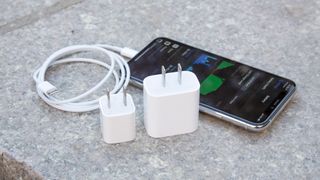iPhone 12 might be the last Apple device with this iconic piece of tech
A swansong for Lightning

Apple isn't quite ready to drop the Lightning port from its iPhones, according to one analyst – however the iPhone 12 looks set to be the last Apple handset to use the proprietary connection.
Jon Prosser, who has a decent track record when it comes to Apple rumors, tweeted that the iPhone 12 "absolutely" would not feature a USB-C port – and if that's the case then the iPhone 12 will stick with Apple's arguably-outdated Lightning tech.
- These are the best iPhones
- What did we think of the iPhone 11 Pro Max?
- What you need to know about the new iPhone SE (2020)
It's not clear where Prosser got this information from – whether from inside Apple itself, or its supply chain, or a case or charging cable manufacturer – but the conviction in that tweet suggests it could be from multiple sources.
I feel like I shouldn’t have to say this, but no — there’s absolutely not USB-C in iPhone 12.Apple will go portless before they go USB-C.April 18, 2020
In January 2020 European Parliament (EP) passed a resolution calling for the introduction of a single common charging port on all smartphones – namely USB-C the standard currently used by most tech companies – which suggested that Apple would have to drop its proprietary ports.
While that resolution isn't binding, the EP issued a deadline of July 2020 for companies to comply. If any companies fail to comply – as would be the case if Apple were to release a Lightning-equipped Phone 12 in September, which is when we expect to see the phone – the Parliament would likely look to pass legislation obliging them to fall into line.
So it does seem that the iPhone 12 could be the last iPhone to pack a Lightning port, with future iPhones and iPads likely to use the faster standard USB-C instead – or, perhaps, to go portless…
A portless iPhone 12?
Prosser ended his tweet by saying 'Apple will go portless before they go USB-C' and some have taken this to imply the iPhone 12 will be a portless device, but this is highly unlikely.
'Portless' would mean a phone with no 3.5mm headphone jack and no USB-C or Lightning port, with the device relying on wireless audio transmission, wireless charging, and wireless data transfer. It's a futuristic concept, but any phones like this right now, such as an un-named device shown off by Oppo last year, are just that – concepts.
Get daily insight, inspiration and deals in your inbox
Get the hottest deals available in your inbox plus news, reviews, opinion, analysis and more from the TechRadar team.
Apple has lost its reputation for innovation in the smartphone world, having yet to launch a foldable or 5G phone, and its phones all still have flat screens and sizeable notches, which most brands have avoided on their 2020 flagships.
So it seems unlikely the company would beat the competition to creating a truly wireless phone, especially given that consumers still use wired headphones and charging a lot – and Apple tends to follow consumer demand rather than lead it.
As for Prosser's claim that "Apple will go portless before they go USB-C", that's likely as much a rhetorical flourish as a serious prediction.
It's much more likely the handset will use a Lightning port, with future iPhones using USB-C until a portless design becomes feasible – Prosser's declaration notwithstanding. However this is all based on rumor – what this space for further developments as we count down to the iPhone 12 launch.
No going notch-less, either
As well as commenting on the connectivity of the iPhone 12, Prosser also tweeted a sketch of the handset's notch. According to Prosser, the iPhone 12 will still have a notch, although it'll be smaller than the one on the iPhone 11, and will still house the Face ID sensors and front-facing camera.
Here you go, internet. 😏 pic.twitter.com/REfSw28KSXApril 20, 2020
Space would be saved because the speaker, which was previously in the notch, would be housed in a very thing bezel at the top of the handset.
The notches on newer iPhones have been a source of ridicule in some quarters, given their large size compared to the equivalents on other phones, and with some flagships using a less-obtrusive 'punch-hole' design, so it's good to see Apple looking for ways to shrink the notch – although according to Prosser's sketch it's still fairly large.
Again, though, this is just a leak, and we'll have to wait for Apple to officially unveil the phone to know for sure.

Tom Bedford was deputy phones editor on TechRadar until late 2022, having worked his way up from staff writer. Though he specialized in phones and tablets, he also took on other tech like electric scooters, smartwatches, fitness, mobile gaming and more. He is based in London, UK and now works for the entertainment site What To Watch.
He graduated in American Literature and Creative Writing from the University of East Anglia. Prior to working on TechRadar, he freelanced in tech, gaming and entertainment, and also spent many years working as a mixologist. He also currently works in film as a screenwriter, director and producer.
